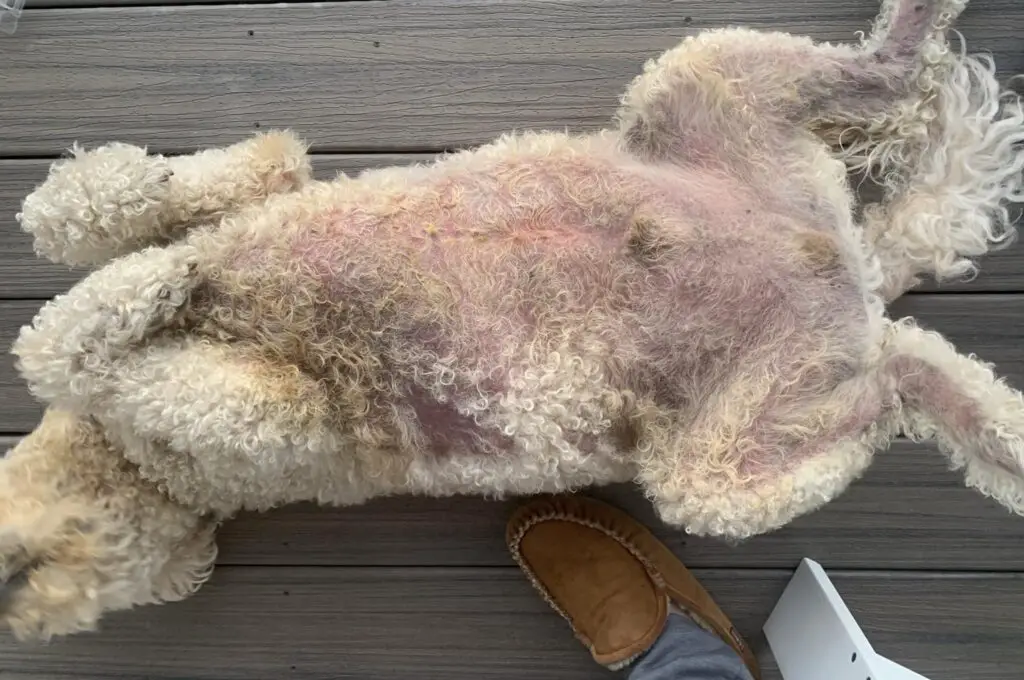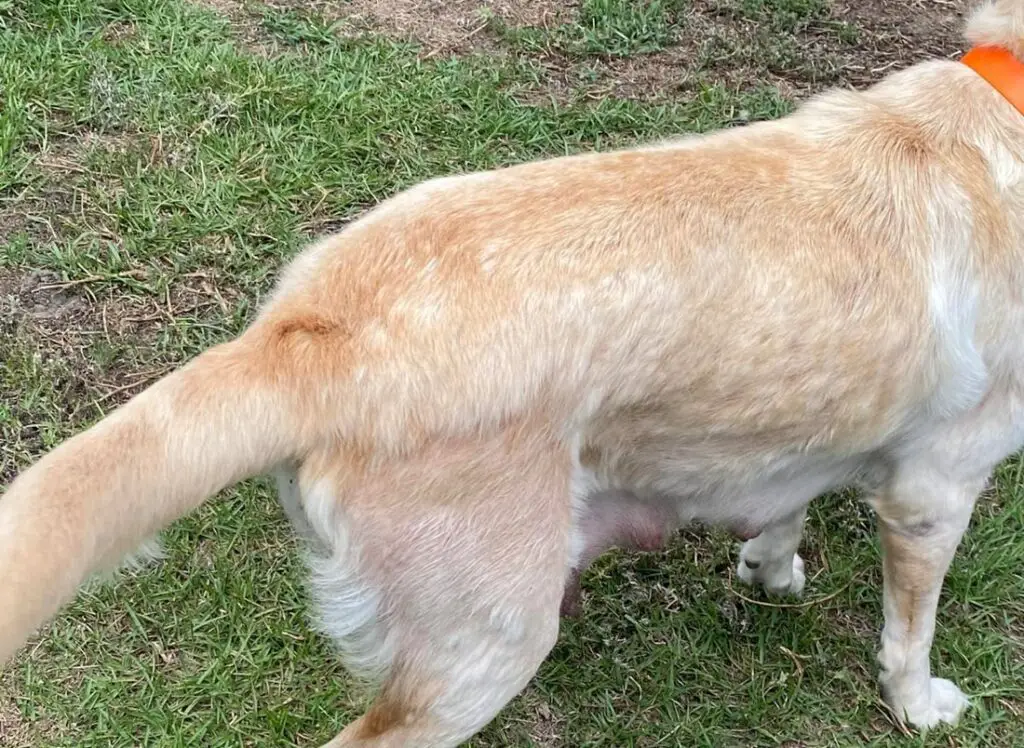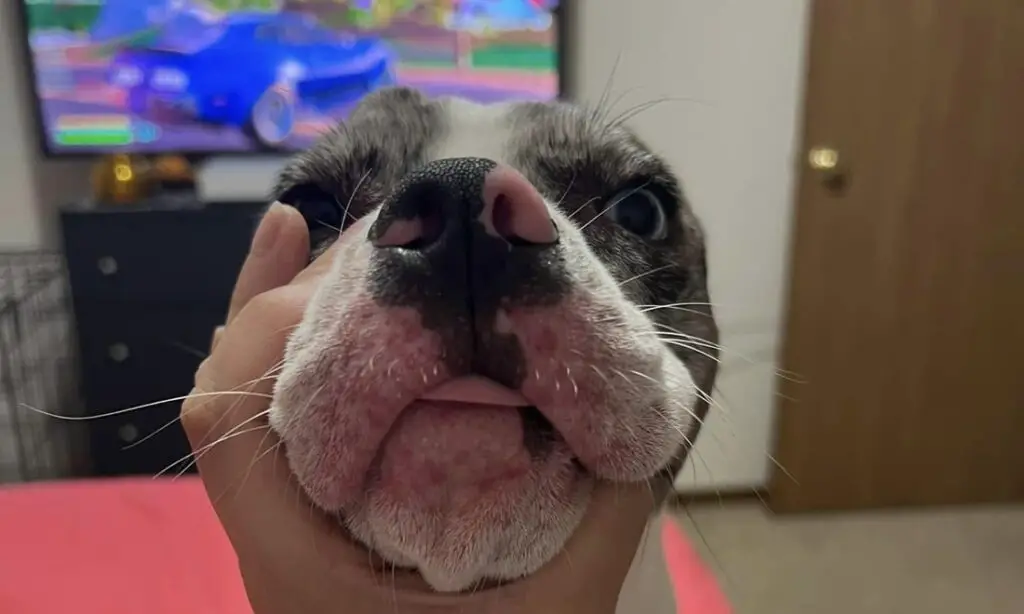If your dog is scratching a lot, even though he doesn’t have any fleas, you may be wondering why he’s so itchy.
There are several reasons that dogs can become itchy, even if they don’t have fleas.
In this blog post, we will discuss some of the most common causes of itchy skin in dogs and how you can treat them.
Key Takeaway
- Your dog might be itchy even without fleas due to several reasons including food allergies, environmental allergens, skin infections, external parasites other than fleas, or even anxiety.
- Symptoms of an itchy dog can include persistent scratching, licking, or chewing at certain parts of their body, redness, sores, and patches of hair loss.
- Helping an itchy dog with no fleas can be achieved by identifying and eliminating potential allergens from their environment or diet, using soothing skin treatments like oatmeal baths or hypoallergenic shampoos, and consulting with a veterinarian for possible medical interventions.
- Preventing dog itching can be achieved by maintaining a balanced diet, regular grooming, keeping your dog’s living environment clean, using flea preventatives, and consulting with a vet for personalized advice based on your dog’s specific needs.
Why Is My Dog So Itchy But Has No Fleas?

Your dog may be excessively itchy even without fleas due to a variety of reasons, including flea allergy dermatitis, atopic dermatitis, food allergies, mites and sarcoptic mange, ear infections, yeast overgrowth or bacterial infections, environmental allergies, dry skin, anxiety or stress, and hormonal imbalances.
Flea Allergy Dermatitis
Flea allergy dermatitis is an allergic reaction to the saliva of fleas. It’s not the flea bite itself that causes the intense itching, but the dog’s allergic response to it.
Even a single flea bite can cause severe itching in a hypersensitive dog. Symptoms often include generalized itching, redness, and hair loss, especially at the base of the tail and hind legs.
As a veterinarian, I’ve seen many cases where the fleas are long gone, but the dog continues to scratch due to this allergic reaction.
Atopy (Atopic Dermatitis)

Atopic dermatitis, or atopy, is a chronic skin disease associated with allergies to dust mites, grasses, pollens, molds, and animal dander. It’s one of the most common causes of chronic itching in dogs.
Dogs with atopy often scratch at their ears, paws, and belly, and may have recurrent ear infections. Over time, the constant scratching can lead to thickened, discolored skin.
In my practice, I’ve observed that certain breeds, including Bulldogs, Retrievers, Beagles, and Terriers, seem to be more prone to atopy.
Food Allergies
Food allergies occur when a dog’s immune system mistakenly identifies a particular food ingredient as harmful and mounts an immune response.
The most common allergens are proteins, particularly those from beef, dairy products, wheat, corn, chicken, and eggs.
Symptoms can include gastrointestinal problems like diarrhea and vomiting, but itchy skin is the most common sign.
Food allergies can be challenging to diagnose because they mimic so many other conditions. Elimination diets are often used to pinpoint the offending ingredient.
Mites and Sarcoptic Mange

Sarcoptic mange, also known as scabies, is a highly contagious skin disease caused by the Sarcoptes scabiei mite.
These microscopic mites burrow into the dog’s skin, causing intense itching and inflammation. Affected dogs often lose hair and develop red, crusty sores.
Because the mites are so tiny, they’re often not seen on skin scrapings, making diagnosis challenging.
In my experience, I’ve found that treating for sarcoptic mange can often provide relief, even when mites aren’t seen on the skin scraping.
Ear Infections
Ear infections can cause your dog to scratch their ears excessively, shake their head, or rub their ears on furniture or the floor.
They may also have redness, swelling, or an unpleasant odor in their ears. Ear infections in dogs are often secondary to allergies, but can also be caused by foreign bodies, trauma, or excessive moisture.
As a vet, I always examine the ear canal carefully to identify the underlying cause of the infection.
Yeast Overgrowth or Bacterial Infections
Dogs have a normal amount of yeast and bacteria on their skin, but when the balance is disrupted, these organisms can overgrow and cause itching.
Symptoms can include redness, greasy or flaky skin, a foul odor, and small red bumps or sores.
Dogs with allergies, hormonal imbalances, or a weakened immune system are more susceptible to yeast overgrowth and bacterial infections.
Environmental Allergies

Environmental allergies, also known as contact dermatitis, occur when a dog’s skin reacts to something in their environment.
This could be anything from laundry detergent residues on bedding, carpet cleaners, certain types of grass, or even the plastic in their food bowl.
The skin that comes into direct contact with the allergen is usually most affected, resulting in redness, itching, and sometimes hives or skin infections says Wikipedia.
Dry Skin
Dry skin in dogs can be caused by a variety of factors, including low humidity, cold weather, poor nutrition, or underlying health conditions.
Dogs with dry skin often have dandruff and hair loss in addition to itching. The skin may appear flaky, rough, or cracked, and the dog may seem uncomfortable or agitated.
Anxiety or Stress
Anxiety or stress can manifest as skin problems in dogs. Itching, scratching, and self-chewing can all be signs of a stressed or anxious dog.
In my practice, I’ve seen many dogs who start scratching or licking when their routine is disrupted or when they’re exposed to stressful situations.
Hormonal Imbalances
Hormonal imbalances can lead to a variety of skin conditions in dogs.
For example, hypothyroidism, a condition where the dog’s body doesn’t produce enough thyroid hormone, can lead to dry skin and hair loss, which can cause itching.
Cushing’s disease, on the other hand, is a condition where the dog’s body produces too much cortisol, also leading to skin problems.
As a vet, it’s always important for me to consider hormonal health when diagnosing a persistently itchy dog.
What Are Some Symptoms Of An Itchy Dog?
The symptoms of an itchy dog can include behaviors such as excessive scratching, licking or chewing at certain areas, redness and inflammation of the skin, and changes in the coat or skin.
Excessive Scratching, Licking or Chewing
One of the most obvious signs of an itchy dog is excessive scratching. Dogs might also lick or chew at certain areas of their bodies.
In my experience as a veterinarian, I’ve noted that the areas dogs tend to focus on can sometimes give clues about the cause of the itch.
For example, frequent ear scratching might suggest an ear infection, while chewing at the base of the tail could indicate a flea problem.
Redness and Inflammation
Redness and inflammation of the skin are common in itchy dogs. This often results from the dog’s scratching and licking, which irritates the skin.
It’s not uncommon for me to see dogs in my clinic with red, inflamed areas, especially on their belly, paws, ears, or around their eyes.
Changes in the Coat or Skin
Changes in the dog’s coat or skin can also signal that a dog is itchy. This could include hair loss, dandruff, or changes in skin color.
Some dogs may develop “hot spots” — areas of skin that become inflamed and infected due to intense scratching or licking. Over time, chronic itching can lead to thickened, discolored skin.
Changes in Behavior
Changes in behavior can also be a sign of itchiness in dogs. An itchy dog might seem restless, have trouble sleeping, or become more withdrawn.
On the other hand, some dogs might seek more attention, wanting to be petted or scratched. I’ve seen many dogs who were brought into my clinic because their owners noticed they just weren’t acting like themselves.
Physical Discomfort
Physical discomfort is another symptom of an itchy dog. The dog might appear to be uncomfortable or in pain, especially when touched in certain areas.
They might also shake their head frequently or rub up against furniture to try to relieve the itch. In my practice, I’ve seen dogs who were so uncomfortable that they had trouble sitting still.
How To Help An Itchy Dog With No Fleas
There are several remedies you can give your dog to stop itching, ranging from home remedies like chamomile and green tea soaks, colloidal oatmeal baths, and dietary changes, to medications such as Oclacitinib (Apoquel).
Chamomile and Green Tea Soaks
Chamomile and green tea have properties that can soothe and cool irritated skin. In my experience as a vet, I’ve found that soaking your dog’s itchy skin in a lukewarm bath with chamomile or green tea bags can provide immediate relief.
The natural compounds in these teas have anti-inflammatory and antiseptic qualities that can reduce skin inflammation and promote healing.
Colloidal Oatmeal Baths
Colloidal oatmeal is ground oatmeal suspended in liquid, which allows it to be easily mixed into a bath. It has been used for centuries to soothe itchy, dry, or irritated skin.
As a vet, I often recommend colloidal oatmeal baths for dogs with itchy skin. The oatmeal can help to moisturize the skin and reduce inflammation, providing relief from itching.
Dietary Changes and Supplements
Certain dietary changes and supplements can also help reduce itching in dogs. Omega-3 fatty acids, found in fish oil, have anti-inflammatory properties and can help improve skin health.
Coconut oil, flaxseed oil, and olive oil can also be beneficial. In some cases, a food allergy may be causing your dog’s itching, so a diet change may be necessary.
In my practice, I’ve seen many dogs’ skin conditions improve significantly after switching to a hypoallergenic diet or adding these supplements.
Aloe Vera
Aloe vera is well-known for its soothing and healing properties. It can be applied directly to your dog’s itchy skin to provide relief.
As a vet, I’ve recommended aloe vera for many dogs with skin irritations or minor wounds. Just be sure to use a product that is safe for dogs, as some aloe vera gels can contain additives that are harmful if ingested.
Anti-itch Medications
In some cases, over-the-counter or prescription anti-itch medications may be necessary. One such medication is Oclacitinib (Apoquel), which works by blocking the itch signal in the dog’s body.
In my experience, Apoquel can be highly effective for dogs with chronic, severe itching, but it should only be used under the guidance of a veterinarian.
What Medication Can You Give a Dog for Itchy Skin?
There are several medications and treatments available to alleviate itchy skin in dogs, including Apoquel, hydrocortisone sprays, medicated shampoos, natural remedies like aloe vera, over-the-counter allergy medications, and injections like CYTOPOINT.
Apoquel
Apoquel is a prescription medication that can provide fast and safe relief for allergic itch in dogs. It starts working within four hours and effectively controls itching for 24 hours.
As a veterinarian, I’ve seen significant improvement in dogs suffering from persistent itching after starting on this medication.
Hydrocortisone Sprays
Hydrocortisone sprays, such as Vet Worthy Hydrocortisone Spray for Dogs, can be applied directly to the affected area to reduce inflammation and itching. These sprays are particularly useful for localized itching or hot spots.
Medicated Shampoos
Medicated shampoos, like the Veterinary Formula Clinical Care Hot Spot & Itch Relief Medicated Spray, offer another option for treating itchy skin.
These shampoos can help alleviate sensitive skin, reduce inflammation, and soothe itchiness.
Steroids
Steroids, such as prednisone, are powerful anti-inflammatory drugs that can provide quick relief from itching.
However, due to potential side effects, they’re typically used as a short-term solution or for severe cases of itching that haven’t responded to other treatments.
Antihistamines
Antihistamines, such as Benadryl (diphenhydramine) or Zyrtec (cetirizine), are often used to treat allergic reactions in dogs that can lead to itching.
These medications work by blocking the histamines that cause inflammation and itching. In my practice, I’ve often prescribed antihistamines to help alleviate the discomfort of allergic reactions in dogs.
CYTOPOINT Injections
For long-lasting relief from atopic dermatitis, CYTOPOINT injections can be administered by your veterinarian. These injections help control itching for a month or longer, giving the skin a chance to heal.
Antibiotics
If a dog’s skin has become infected from scratching, antibiotics may be necessary to treat the infection. Antibiotics can be given orally or applied topically, depending on the severity and location of the infection.
How To Prevent Dog Itching
Preventing dog itching involves a combination of strategies including regular grooming, maintaining a healthy diet, using appropriate flea treatments, and strengthening gut health with probiotics.
Regular Grooming
Regular grooming is essential to keep your dog’s skin and coat in optimal condition. Brushing helps to remove dead skin cells and fur, distribute natural oils, and check for parasites like fleas or ticks that can cause itching.
I’ve seen many dogs whose itching was significantly reduced simply through regular, thorough grooming.
Healthy Diet
A balanced diet plays a crucial role in maintaining a dog’s overall health, including the health of their skin and coat. Certain foods are known to promote skin health, such as those rich in omega-3 fatty acids like fish oil.
I’ve advised many pet owners to incorporate these into their dogs’ diets and have observed noticeable improvements in their skin conditions.
Flea Treatments
Keeping up to date with flea treatments is another important preventative measure. Fleas are a common cause of itching in dogs, so using a reliable flea treatment can help prevent infestations and the associated discomfort.
In my practice, I’ve found that consistent flea prevention is one of the most effective ways to prevent itchiness in dogs.
Probiotics for Gut Health
Strengthening gut health with probiotics can also contribute to skin health. A healthy gut can improve a dog’s immune response, which can in turn reduce allergic reactions that lead to itching.
I’ve recommended probiotics to dog owners dealing with persistent itching and have often seen positive results.
Use of Anti-Itch Shampoos or Soothing Wipes
Anti-itch shampoos or soothing wipes can provide immediate relief from itching. They typically contain ingredients like aloe vera or oatmeal that can soothe inflamed skin.
I’ve seen many dogs find relief from persistent itching through the use of these products.
Is Dog Itching Serious?
Dog itching can indicate a variety of health concerns, some of which are serious and require immediate attention, while others may be more minor and easily treatable.
Itching in dogs is a common symptom that every dog experiences from time to time, but excessive or persistent itching should not be ignored. It can be caused by various factors, such as allergies, skin infections, parasites, or underlying health conditions.
From my experience as a veterinarian, I’ve seen cases where mild itching was just a reaction to a new shampoo or a minor bug bite and resolved quickly with minimal intervention.
However, I’ve also seen dogs that were scratching incessantly due to severe allergic reactions, painful skin infections, or harmful parasites like fleas or mites. In these situations, the itching was not only a sign of discomfort but also an indication of a condition that needed immediate treatment to prevent further complications.
Moreover, constant scratching or licking can lead to secondary issues like wounds, hair loss, and skin infections, which can significantly affect a dog’s quality of life and may require more complex treatments.
Why Is My Dog Itching And Losing Hair?
A dog itching and losing hair can be symptomatic of several conditions such as allergies, infections, parasites, or even underlying health issues like Cushing’s disease.
Allergies
Allergies are a common reason for dogs to itch and lose hair. Dogs can be allergic to a variety of things, including certain foods, environmental triggers, or even the ingredients in their shampoo.
When a dog is allergic to something, their body’s immune response can cause skin inflammation, which leads to itching and can result in hair loss.
Infections
Bacterial or yeast infections can cause a dog to itch and lose hair.
These types of infections often occur when a dog’s skin is irritated or damaged, which can happen as a result of scratching due to allergies or parasites.
In my practice, I’ve treated many dogs with skin infections that were causing them to scratch and lose hair.
Parasites
Parasites, such as fleas or mites, are another common cause of itching and hair loss in dogs.
These tiny creatures can cause severe itching, leading a dog to scratch or chew at their skin, which can result in hair loss.
I’ve seen numerous cases in my clinic where treating a simple flea infestation has resolved a dog’s itching and hair loss.
Underlying Health Issues
Underlying health issues, such as Cushing’s disease, can also cause a dog to itch and lose hair.
Cushing’s disease is a condition that causes the body to produce too much cortisol, a hormone that can lead to skin problems, among other symptoms.
In my experience, dogs with this disease often have thinning hair and may scratch due to skin irritation.
Trauma
Trauma to the skin, whether from external injuries or self-inflicted from excessive licking of a specific area (acral lick dermatitis), can cause hair loss in dogs.
In such instances, I’ve noticed that hair loss often occurs in the area of the skin that the dog has been licking or scratching.
Can Dogs Itch From Mosquito Bites?
Dogs can indeed experience itching from mosquito bites, just like humans, and these bites can also potentially lead to more serious health issues.
Mosquito bites frequently cause itching and discomfort in dogs. The reaction is due to the body’s response to the mosquito’s saliva, which is an irritant.
It’s quite common for a dog to experience redness, swelling, and itchiness at the site of a mosquito bite.
In my time as a veterinarian, I’ve seen many dogs come in with the telltale signs of mosquito bites.
Their owners often report that the dogs have been scratching or biting at the area, which is a clear indication of itching. In some cases, the itching can be intense and may require treatment to provide the dog with relief.
However, it’s important to note that the itching itself isn’t the only concern when it comes to mosquito bites in dogs. Mosquitoes can transmit parasites, such as heartworms, which can lead to serious health problems.
I’ve treated dogs that were infected with heartworms, and it’s a devastating disease that can be difficult to treat, especially in its later stages.
FAQs
Q: Can dogs have allergies?
A: Yes, dogs can have allergies. Just like humans, they can be allergic to certain substances, such as pollen, dust mites, or certain foods.
Q: What are some signs that my dog may have an allergic reaction?
A: Signs of an allergic reaction in dogs can include itching and scratching, red and irritated skin, hair loss, and recurrent ear infections.
Q: How can I determine if my dog has a food allergy?
A: If you suspect that your dog has a food allergy, your veterinarian may recommend an elimination diet to identify the specific food that is causing the allergic reaction.
Q: What should I do if my dog keeps licking and scratching?
A: If your dog keeps licking and scratching, it is important to consult with your veterinarian. They can help determine the underlying cause and recommend the appropriate treatment plan.
Q: What can I do to relieve my dog’s itching?
A: There are several things you can do to help if your dog is itching. This includes keeping their skin clean and moisturized, using an anti-itch shampoo, and providing them with regular flea treatment.
Q: Can a skin infection cause itching in dogs?
A: Yes, a skin infection can cause itching in dogs. Bacterial or fungal infections can lead to skin irritation and make your dog itch.
Q: What is the best treatment for my dog’s itchy skin?
A: The best treatment for your dog’s itchy skin will depend on the underlying cause. Your veterinarian can recommend the most appropriate treatment plan based on your dog’s specific condition.
Conclusion and final thoughts
In conclusion, understanding the root cause of your dog’s itching is crucial in providing effective treatment and relief.
While fleas are a common culprit, other factors such as allergies, skin conditions, or even behavioral issues may also contribute to your dog’s discomfort.
It is important to observe your dog’s behavior and consult with a veterinarian for a proper diagnosis and treatment plan.




